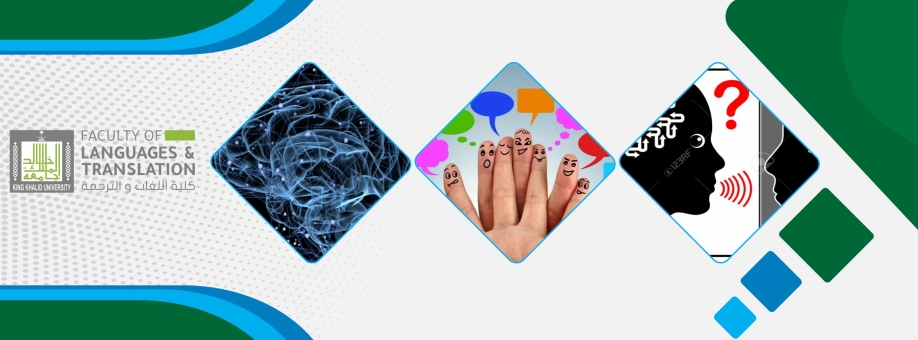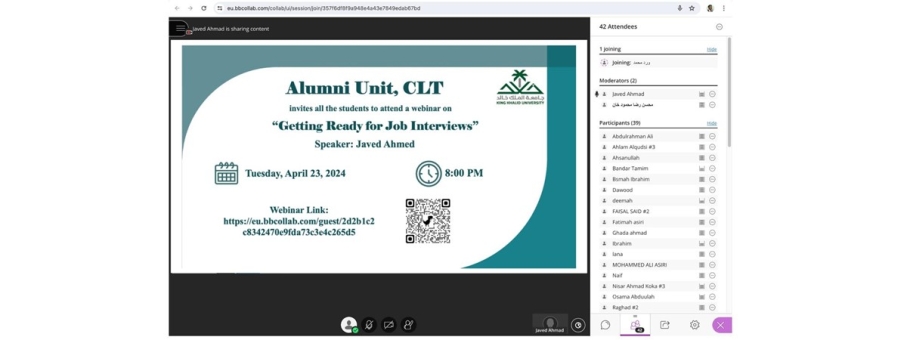On February 28, 2021, Dr. Sara Sevinj Huseynova delivered an in-service instructor training webinar to almost 500 attendees. The webinar, in cooperation with the Ministry of Education Directorate in the Asir region and Rijal Alma on "Teaching Language Skills: Basic Ideas and Techniques for Instructing Listening and Speaking", was warmly received by local participants and attendees from around the Kingdom.
The Dean of the Faculty of Languages and Translation, Dr. Abdullah Al-Melhi, opened the webinar by underlining the effectiveness of initiating the interaction of instructors teaching the same subject in order to improve their performance. Dean Al-Melhi then introduced keynote speaker Sara Huseynova, who he pointed out as well "needs no introduction".
Vice Dean for Academic Development & Quality, Dr. Abdulrahman Almosa, related that he planned this event after receiving a request from the local Directorate of Education, underlining that it was an excellent opportunity for the Faculty of Languages and Translation to provide a unique instructor training opportunity that combines professional growth opportunity with online discussions in a very business-like manner.
Following after, Dr. Huseynova started the webinar presentation noting that languages are learned through excitement and not through fear of mistakes, and shared her knowledge on how to inspire the students for a greater attitude to learning English and the 4 basic language skills: listening, speaking, reading, and writing. She pointed out the necessity to balance those skills and practice them according to the new tendencies in the language's instruction. "The same way languages are taught at the English Department of the FLT," she stressed.
Dr. Huseynova then started the discussion of the skills teaching general approach in applied linguistics like the focal method, content-based instruction and also, task-based approach, which is currently widely used in language instruction worldwide.
Participants were then introduced to the fact that the core principles of teaching listening and speaking with the task-based approach are generally the same even though one is receptive and the other one is productive. The principles, Dr. Huseynova said, are communicative teaching, interactive and task-based learning, learner-centered instruction, group and blended learning. According to sociolinguists, communication takes place mainly visually, and also, vocally and verbally. In the communicative approach, she added, students might successfully be engaged in interactive learning, which also involves authentic language input in real-world contexts.
The keynote speaker also emphasized the appropriateness of the textbook: the material used might well include various culture and gender-appropriate topics and interactive activities that invite students to talk and respond. Moreover, teachers need to prepare lesson plans based on the textbook; however, the general instructional line of the lesson should, by all means, involve the ideas of communicative approach in action.
Dr. Huseynova recommends that the teachers help students have proper exposure to genuine English usage. The teachers should apply both controlled and non-controlled techniques along with efficient but not overwhelming use of technology in class. The presenter mentioned real-life characteristics and difficulties of listening and speaking processes, making oral communication difficult to teach, evermore during online instruction with so much possible distraction. Overall, the lessons should be fully learner-centered with less lecturing or reduced "Teacher Talk Time", with the instructor being a role model and art director to improve student-teacher interaction.
While explaining the interactive teacher roles, the presenter focused on unlocking the students' knowledge before letting the students practice listening, which activates their schematic knowledge. Pre-listening encourages discussion around the theme of the unit with inspiration from interesting questions and striking visuals. Pre-listening may include pronunciation practice as well, which may help improve the overall listening comprehension, and post-listening activities can deepen the development of all 4 core language skills.
The keynote speaker also explained in detail the basic principles of modern teaching strategies for listening, creative and interactive teacher roles, how to encourage students to listen and talk, and assessment methods, the necessity to provide the appropriate feedback in a manner that will be well-received by the students, for the right feedback to "make the students' brains smarter, even happier."
Later, she mentioned the appropriateness of using the flipped classroom model for teaching listening and speaking, especially during online education. In the traditional classroom, a lower level of understanding happens in class. With the flipped classroom model, learning is flipped, and the students can finish the lower level of cognitive work before the lesson starts, and the teacher will continue with applying the knowledge and practicing listening and speaking skills in class. The visual flipped Maslow's pyramid on Bloom's Taxonomy was a striking explanation of the usefulness of the flipped classroom method of teaching 4 skills, particularly online during the COVID-19 pandemic.
The conclusion was that it is very important to create an effective rapport with the students and share the appropriate knowledge they need. An instructor is to praise the students in a balanced way with mild criticism while giving corrective feedback, with a genuine heart-felt attitude and desire to help the student, which shows the teacher's genuine interest in each and every student's performance and language growth. The feedback should be given tactfully so that the students are not embarrassed or anxious, by any means not to lose interest in learning English.
Dr. Huseynova guided participants through a series of strategies they can use to evaluate and improve their online instruction, after which she took numerous questions from the audience, and the discussion of those questions lasted for an additional hour which shows the participants were so eager for the professional interaction concerning their professional growth. Dean Al-Melhi and Vice Dean Almosa actively participated in the ensuing discussions and exchange of views.
Overall, the webinar was, as Dean Al-Melhi noted, as informative and interesting as having a "lighthouse effect" on the participants. The webinar was a great success with 500 teacher-participants. The Bachelor of Arts in English program at the Faculty of Languages and Translation is committed to participating in community collaboration projects as part of its role in the Community Partnership Plan at King Khalid University.
Date: 3-5-2021
Source: Faculty of Languages and Translation







